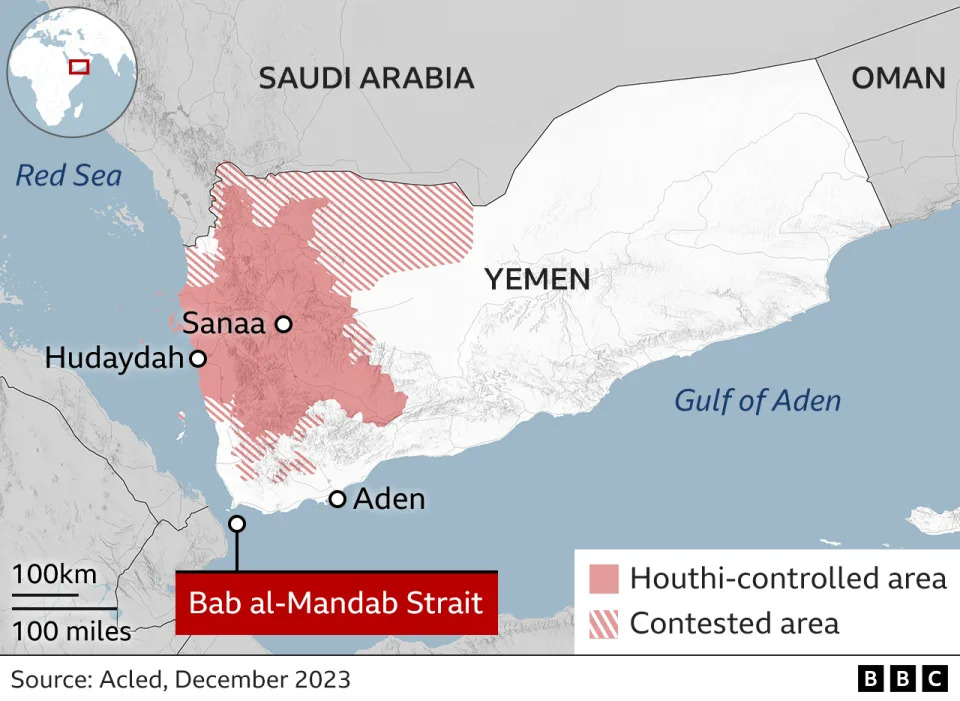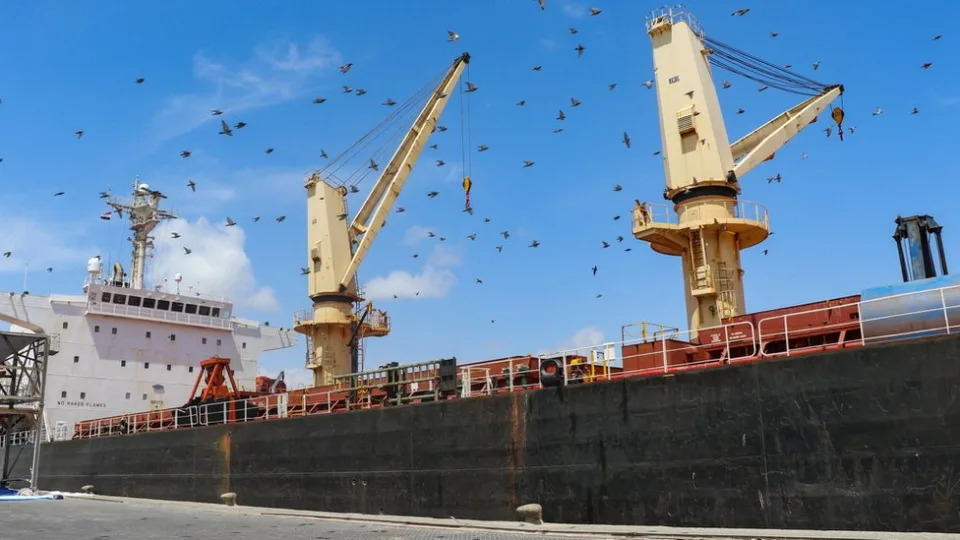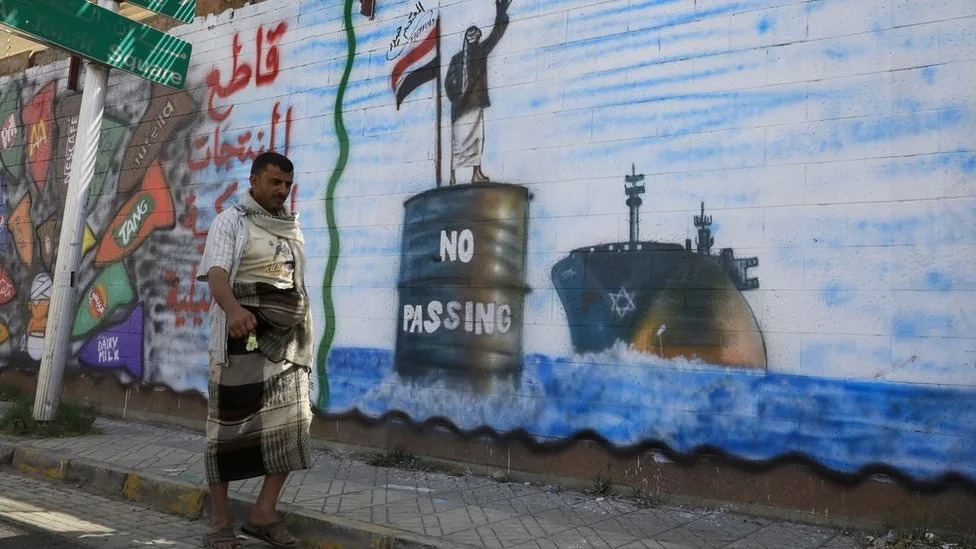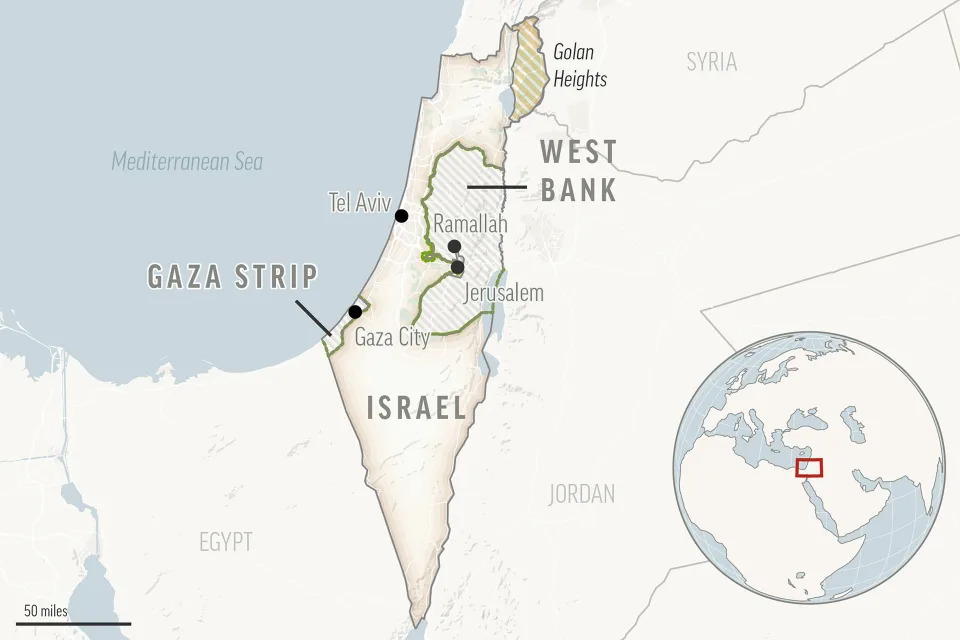Yemen's Iran-aligned Houthis claimed responsibility for an attack on a UK-owned cargo ship and a drone assault on an American destroyer on Thursday, and they targeted Israel's port and resort city of Eilat with ballistic missiles and drones.
Armed Houthi followers parade in Sanaa.
The statement by a Houthi representative on social media site X came shortly after the group's leader said it was ramping up attacks on ships in the Red Sea and other waters - including with new "submarine weapons" - to mirror Israel's military operations in the Gaza Strip.
Houthi militants have launched repeated drone and missile strikes in the Red Sea, Bab al-Mandab Strait and Gulf of Aden since November in support of Palestinians, as the Israel-Hamas war continues and the Gaza death toll reaches almost 30,000.
"Operations in the Red and Arabian Seas, Bab al-Mandab Strait, and the Gulf of Aden are continuing, escalating, and effective," Abdul Malik al-Houthi added in a televised speech. He gave no details of the submarine weapons.
The group's strikes are disrupting the vital Suez Canal trade shortcut that accounts for about 12% of global maritime traffic, and forcing firms to take a longer, more expensive route around Africa.
The Houthis on Thursday sent shippers and insurers formal notice of what they termed a ban on vessels linked to Israel, the U.S. and Britain from sailing in surrounding seas, seeking to reinforce their military campaign.
The Houthis' communication, the first to the shipping industry outlining a ban, came in the form of two notices from the Houthis' newly dubbed Humanitarian Operations Coordination Center sent to shipping insurers and firms. The aim is to force sailing companies to collaborate with the Houthis to guarantee the safety of their ships,
Ships owned by individuals or entities in Israel, the U.S. and U.K. or sailing under their flags are banned from the Red Sea, Gulf of Aden and Arabian Sea, Thursday's notices said.
"The Humanitarian Operations Center was established in Sanaa to coordinate the safe and peaceful passage of ships and vessels that have no connection to Israel," a senior Houthi official told Reuters on Thursday.
RISK PRICED IN
The months of attacks have upset global trade and reset shipping rates at a higher level. Insurance sources on Thursday said there was no change in rates since the issuance of the advisories because marine underwriters had already restricted coverage availability or increased rates.
"In terms or marine war insurance availability and pricing, we don't see a significant effect from the Houthi group's recent announcement since it echoed similar announcements from last year to target Israel, U.S. and UK-linked vessels," Marcos Alvarez, managing director, global insurance ratings, Morningstar DBRS, told Reuters.
Militant leader al-Houthi said retaliatory strikes by the U.S.-British coalition have failed to stop its campaign.
Earlier on Thursday, two missiles set ablaze a ship some 70 nautical miles southeast of Aden, Yemen, the United Kingdom Maritime Trade Operations (UKMTO) agency said. The vessel and crew were reported safe and are proceeding to the next port of call, it said in a later update.
That UK-owned, Palau-flagged ship, the Islander, was en route to Egypt from Thailand, according to British maritime security firm Ambrey and ship tracking data.
The U.S. military's Central Command said in a social media post that the U.S. shot down six Houthi drones in the Red Sea after they were identified as an imminent threat to U.S. and allied warships.
No ships have been sunk nor crew killed during the Houthi campaign. However there are concerns about the fate of the UK-registered Rubymar cargo vessel, which was struck on Feb. 18 and its crew evacuated.
The Houthis said the Rubymar was at risk of sinking but a U.S. defence official said it remained afloat.
Rubymar is "sitting lower still in the water," Ambrey said. A salvage attempt was aborted and a navigation warning to nearby ships was in place, the firm said. Other options are under consideration, the vessel's security company ISS-SAPU said.
Earlier on Thursday, Israel's military also said it intercepted a target in the area of the Red Sea after sirens warning of incoming rockets and missiles sounded in the southern city of Eilat.
UK-owned ship damaged in Houthi missile attack off Yemen, US says
The Houthis say they are attacking Israel, US and British ships to show support for the Palestinians in the war in Gaza.
A Palau-flagged, British-owned cargo ship was damaged and a minor injury was reported in the Gulf of Aden after it was hit by two missiles launched by Yemen's Houthis, the US military says.
The Islander is continuing its voyage following the attack south-east of the Yemeni port city of Aden.
UK maritime authorities said the missiles caused a fire on board.
A Houthi spokesman confirmed they had targeted the Islander and said they had also launched drones at a US warship.
The Houthis, who are backed by Iran and control much of north-western Yemen, have been attacking merchant vessels in the region since November.
They say their attacks are a show of support for the Palestinians in the war between Israel and Hamas in the Gaza Strip, and have claimed - often falsely - that they are targeting ships only linked to Israel, the US or the UK.
US and British warships have been deployed as part of an international task force to protect freedom of navigation and commercial shipping in the critical waterway, which accounts for about 12% of global seaborne trade.
US forces, occasionally backed by British warplanes, have also been striking Houthi military targets in Yemen in response to the attacks since mid-January, but so far the Houthis have not been deterred.
The US military's Central Command said in a statement on Thursday that between 04:30 and 05:30 (01:30-02:30 GMT) US aircraft and a coalition warship shot down six Houthi one-way attack unmanned aerial vehicles (UAVs), or drones, in the Red Sea.
Later, between 08:30 and 09:45, the Houthis fired two anti-ship ballistic missiles from southern Yemen into the Gulf of Aden, it added.
"The missiles impacted MV Islander a Palau-flagged, UK-owned, cargo carrier causing one minor injury and damage. The ship is continuing its voyage."
Earlier, the United Kingdom Maritime Trade Operations (UKMTO) agency reported that two missiles set ablaze a vessel - which it did not identify - about 70 nautical miles (130km) south-east of Aden. It said the vessel and crew were safe and proceeding to their next port of call.
According to maritime security firm Ambrey the ship's AIS transponder gave its destination as "Syrian crew on board", but it appeared to be heading in the direction of the Red Sea from Thailand.

The Israeli military meanwhile said its air defence system had successfully intercepted a "launch which was identified in the area of the Red Sea and was en route to Israel".
The Houthi spokesman later confirmed they had launched missiles and drones at various targets in what it called the "south of occupied Palestine".
In a televised speech on Thursday afternoon, the Houthis' leader said a total of 48 ships had now been targeted and that 13 operations had been carried out in the past week because the US and UK had "failed".
"Operations in the Red and Arabian Seas, Bab al-Mandab Strait, and the Gulf of Aden are continuing, escalating, and effective," Abdul Malik al-Houthi declared.
He also announced that the Houthis had introduced "submarine weapons", which he described as "worrying for the enemy".
On Monday, the crew of a Belize-flagged, British-registered cargo vessel Rubymar had to abandon ship in the Bab al-Mandab Strait - which connects the Gulf of Aden with the Red Sea - after it was hit by a Houthi missile and started letting in water.
Images of the ship from Wednesday, which were obtained by the BBC, showed the ship was down by the stern but had not sunk, as the Houthis initially claimed. It is carrying 22 tonnes of a fertiliser classified as "very dangerous".

The Houthis also said they had attacked two US-owned cargo ships in the Gulf of Aden on Monday. The US military confirmed that two missiles were fired at one of them, the Greek-flagged Sea Champion, which was able to continue its journey to Aden to deliver grain.
The US state department condemned the attacks as "reckless and indiscriminate", warning that they had delayed deliveries of critical humanitarian aid to Yemen, Sudan and Ethiopia.
It also said the US and its allies would continue to take "appropriate action".
Houthi rebel attack sets cargo ship ablaze, forces Israel to intercept another attack near Eilat
Yemen's Houthi rebels launched attacks Thursday on both Israel and a ship traveling through the Gulf of Aden, setting the vessel ablaze and again demonstrating their ability to launch assaults despite facing U.S.-led airstrikes targeting their forces.
The rebels' supreme leader, Abdul Malik al-Houthi, announced an “the escalation in sea operations” conducted by his forces as part of what they describe a pressure campaign to end Israel's war on Hamas in the Gaza Strip. But the Houthis' targets have grown more random since their attacks began in November, endangering a vital waterway for cargo and energy shipments traveling from Asia and the Middle East onward to Europe.
The attack Thursday in the Gulf of Aden saw two missiles fired at a Palau-flagged cargo ship named Islander, the U.S. military's Central Command said. A European naval force in the region described the attack as sparking a fire and wounding one sailor on board the vessel, though the ship is continuing on its way.
The Islander had been coming from Thailand bound for Egypt and previously sent out messages saying “SYRIAN CREW ON BOARD” to potentially avoid being targeted by the Houthis. Other vessels similarly have sent messages identifying their crews as Muslims or not affiliated with Israel to try and avoid rebel attacks.
Meanwhile, sirens sounded early Thursday morning over the southern Israeli port of Eilat, followed by videos posted online of what appeared to be an interception in the sky overhead.
The Israeli military later said the interception was carried out by its Arrow missile defense system.
Israel did not identify what the fire was, nor where it came from. However, the Arrow system intercepts long-range ballistic missiles with a warhead designed to destroy targets while they are in space.
The system “successfully intercepted a launch which was identified in the area of the Red Sea and was en route to Israel,” the Israeli military said. “The target did not cross into Israeli territory and did not pose a threat to civilians.”
Eilat, on the Red Sea, is a key port city of Israel. On Oct. 31, Houthis first claimed a missile-and-drone barrage targeting the city. The rebels have claimed other attacks targeting Eilat, which have caused no damage in the city.
Houthi Brig. Gen. Yahya Saree claimed the attacks in a statement late Thursday night.
The Houthis “persist in upholding their religious, moral and humanitarian duties towards the Palestinian people and in defense of their beloved Yemen in the face of American-British aggression,” Saree said in a prerecorded statement. “Military operations will not stop unless the aggression stops and the siege on the Palestinian people in the Gaza Strip is lifted.”
Saree also claimed a drone attack on a U.S. warship in the region. Central Command said it and an allied warship shot down six Houthi drones in the Red Sea. France's military claimed downing two of the Houthi drones.
Since November, the rebels have repeatedly targeted ships in the Red Sea and surrounding waters over the Israel-Hamas war. Those vessels have included at least one with cargo for Iran, the Houthis’ main benefactor, and an aid ship later bound for Houthi-controlled territory.
Despite a month of U.S.-led airstrikes, Houthi rebels remain capable of launching significant attacks. This week, they severely damaged a ship in a crucial strait and downed an American drone worth tens of millions of dollars. The Houthis insist their attacks will continue until Israel stops its combat operations in the Gaza Strip, which have enraged the wider Arab world and seen the Houthis gain international recognition.
Al-Houthi, the rebels' leader, gave a televised speech in which he described an escalation in their attacks.
"Missiles, drones and military boats have been activated, and submarine weapons have been introduced into our operations at sea, which is worrying to the enemy,” he said. Central Command in recent days acknowledged destroying an underwater bomb-carrying Houthi drone.
Al-Houthi also denied his forces were allowing some vessels pass through the waterways by Yemen unharmed after paying protection money.
“The enemy failed in the face of our operations at sea," he said. “He was not able to prevent them, nor was he able to deter them, nor was he able to limit or reduce them.”
The Houthis, a Zaydi Shiite group, seized Yemen's capital in 2014 and have battled a Saudi-led coalition since 2015. Their Zaydi people ran a 1,000-year kingdom in Yemen up until 1962.
The U.S. State Department has criticized “the reckless and indiscriminate attacks on civilian cargo ships by the Houthis” that have delayed humanitarian aid including food and medicine bound for Ethiopia, Sudan and Yemen. That includes the Sea Champion, a ship carrying corn and other aid to both Aden and Hodeida that was recently targeted.
“Contrary to what the Houthis may attempt to claim, their attacks do nothing to help the Palestinians,” State Department spokesperson Matthew Miller said in a statement. “Their actions are not bringing a single morsel of assistance or food to the Palestinian people.”





